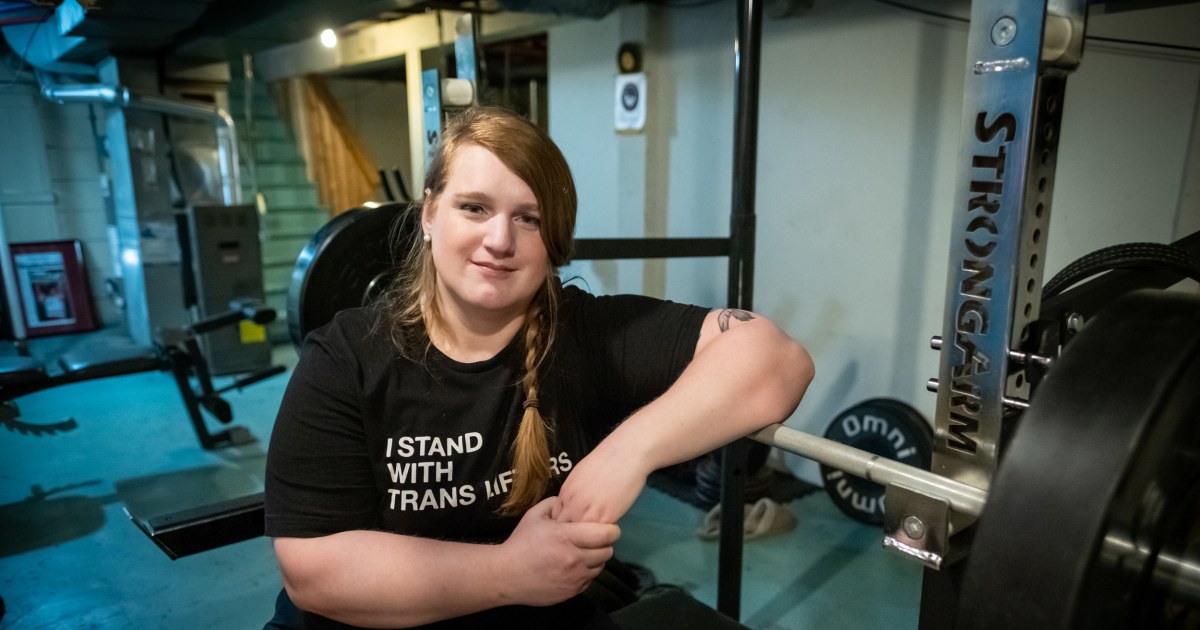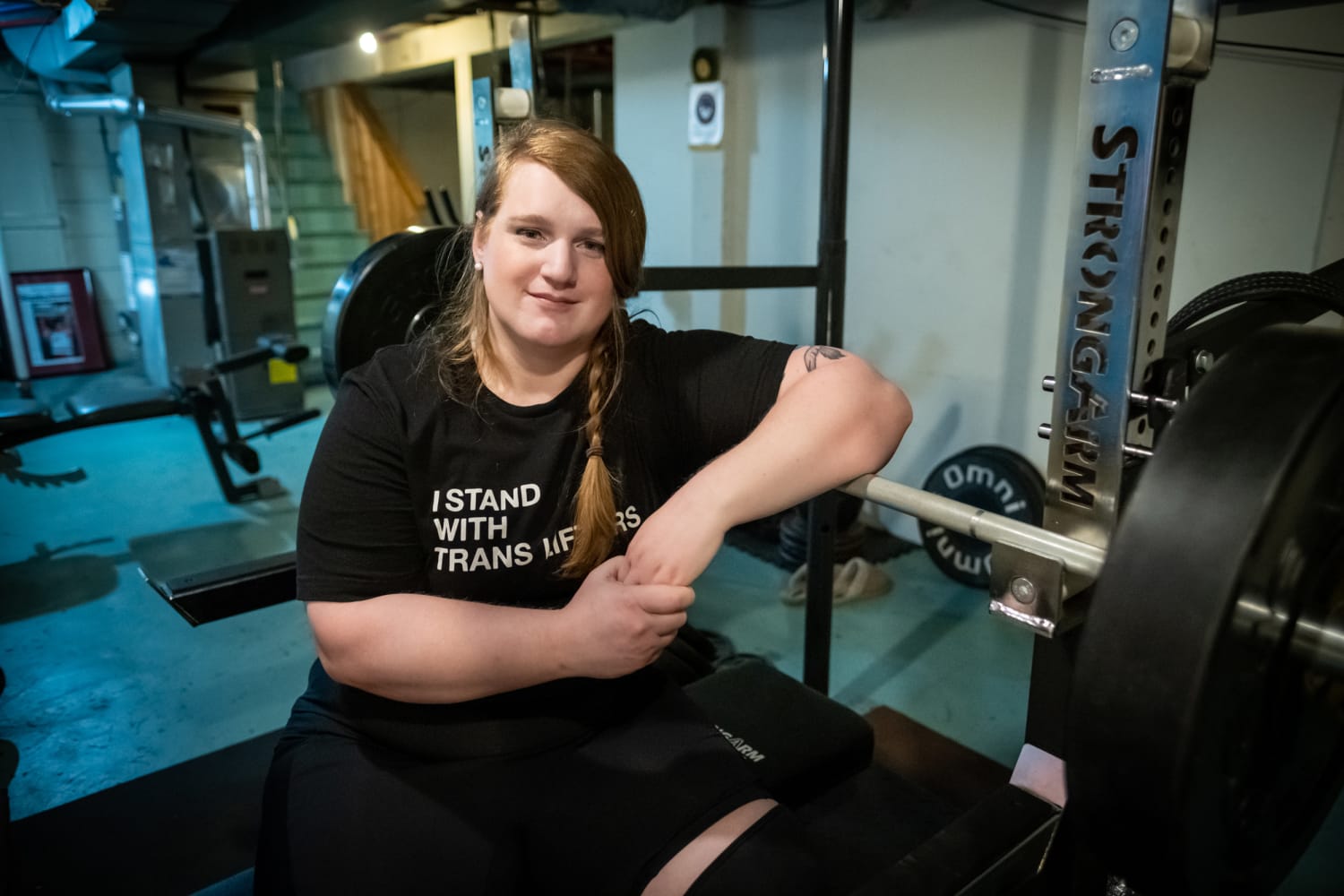
Transgender powerlifter JayCee Cooper is suing USA Powerlifting, the sport’s biggest U.S.-based organization, after it barred her from competition on the basis of her gender identity.
“It came as a surprise to me that when I applied to compete at my first competition, I was told that I couldn’t compete specifically because I’m a trans woman,” Cooper said at a news conference Tuesday. “I was gutted. I had been training for months and up until that point had experienced so much love and community around the sport.”
Cooper’s lawsuit, filed Tuesday in Minnesota state court by the Minnesota-based advocacy group Gender Justice, asserts that in banning Cooper and other trans athletes, USA Powerlifting, or USAPL, is in violation of the Minnesota Human Rights Act.
The suit also notes that other powerlifting and athletic organizations — on the local, national and international levels — have measures that allow transgender women to participate.
The International Olympic Committee adopted guidelines in 2015 permitting trans women to compete if their testosterone remains below a certain level for at least 12 months. The International Powerlifting Federation, the parent organization of USA Powerlifting, adopted the IOC’s guidelines, but the international group doesn’t mandate that its national affiliates follow them.
Cooper’s lawsuit says she was rejected from competing even though she provided documentation that her testosterone levels had remained under the IOC’s accepted limit for two years.
“USAPL denied Ms. Cooper’s eligibility to compete because she is a transgender woman, withdrew her competition card because she is a transgender woman, and then went on to adopt a categorical ban on participation by transgender women athletes at USAPL competitions,” the lawsuit says. “USAPL discriminated against JayCee Cooper, and continues to do so, because she is a transgender woman.”
USA Powerlifting didn’t immediately respond to a request for comment about the lawsuit.
‘Powerlifting is not a fit for every athlete’
USA Powerlifting didn’t have established guidelines about transgender athletes until January 2019, around the same time it informed Cooper that she couldn’t compete.
“USA Powerlifting is not a fit for every athlete and for every medical condition or situation,” the organization’s Transgender Participation Policy states. “Simply, not all powerlifters are eligible to compete in USA Powerlifting.”
The policy says USA Powerlifting is a “sports organization with rules and policies” that “apply to everyone to provide a level playing field.” In a question-and-answer section about trans women’s inability to compete, the organization says powerlifting is a “sport of strength,” as opposed to a “sport of skill.”
“Men naturally have a larger bone structure, higher bone density, stronger connective tissue and higher muscle density than women,” it says. “These traits, even with reduced levels of testosterone do not go away. While MTF [male-to-female] may be weaker and less muscle than they once were, the biological benefits given them at birth still remain over than of a female.”
A study published last month in the British Journal of Sports Medicine found that transgender women maintain an athletic advantage over their cisgender peers even after a year on hormone therapy. After two years, however, transgender women were “fairly equivalent to the cisgender women,” according to the study’s lead author. The findings were based on physical assessments of transgender military service members, not competitive athletes.
Cooper’s story drew national attention in January 2019 after she posted about it on Instagram. She drew support from fellow powerlifters and Rep. Ilhan Omar, D-Minn., who slammed USA Powerlifting’s policy as “discriminatory” and “unscientific.”
Cooper said Tuesday that she began lifting in 2018 and said training her body for the sport empowered her in ways she couldn’t previously have imagined.
“As a trans person, this took on additional meaning, because our bodies are so politicized and demonized regularly,” she said.
The news conference included video clips from several professional athletes expressing their support for Cooper, including a former soccer player for the U.S. Women’s National Team and members of the Minnesota Vikings football team.
“There are a myriad of factors that help determine someone’s success in competition,” Erin Maye Quade, advocacy director at Gender Justice, said Tuesday. “Anti-trans propaganda’s fixation on a single factor lays bare their plot to perpetuate rigid ideas about how women are supposed to look and sound and act.”
Cooper said she hopes her lawsuit will open doors for other transgender athletes.
“I grew up pursuing Olympic dreams, and that was taken away from me in the sport of powerlifting,” Cooper said. “I don’t want anyone to experience what I and other trans athletes have and continue to experience.”
Source: | This article originally belongs to Nbcnews.com









